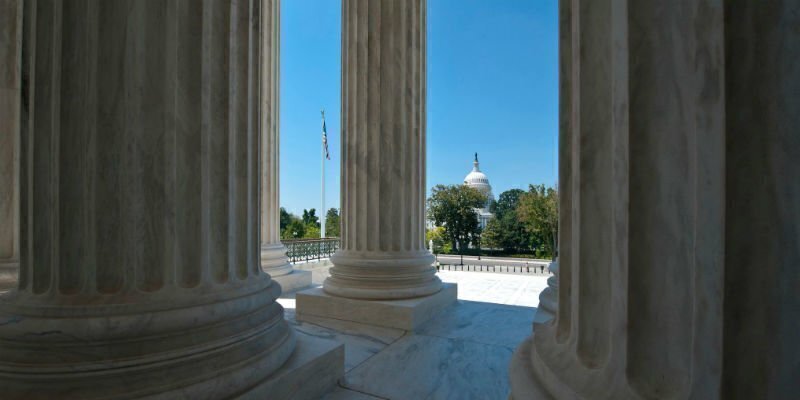Should there be term limits for members of Congress and the Supreme Court?
 The 22nd Amendment sets a two-term limit on the office of the President.
Should members of the other two branches follow the same rule?
The 22nd Amendment sets a two-term limit on the office of the President.
Should members of the other two branches follow the same rule?
A limit on the President’s tenure was inspired by George Washington, who established the custom of Presidents voluntarily leaving the office after two terms. His decision to step down is celebrated by the song "One Last Time" in the Broadway musical Hamilton, in which Alexander Hamilton confronts Washington: “Why do you have to say goodbye?” Washington replies confidently: “[T]he nation learns to move on / It outlives me when I’m gone.” The move was seen as an important safeguard against tyrannical power.
Several later Presidents tried for a third term in office, but none were successful until Franklin Delano Roosevelt’s re-election to a third term in 1940. Republicans, led by their presidential nominee Wendell Wilkie, campaigned against a third-term President, but Roosevelt won by insisting that he was in the race to keep America out of the war in Europe.
Serious talk of an amendment didn’t start until 1944 when Republican opponent Thomas Dewey argued that a fourth Roosevelt term would be a threat to democracy. Then, in 1947, a Republican-controlled Congress sent a 22nd Amendment to the states for ratification. On February 27, 1951, the amendment was finally ratified.
In the modern era, Americans concerned about government corruption and accountability have turned to the idea of term limits as a tool for improving the work of Congress and the Supreme Court. Indeed, Republican presidential candidates Marco Rubio and Ted Cruz are among those who have expressed support for such a proposal. But are term limits for the legislative and judicial branches a good idea?
There is certainly wide support for reform. In a 2013 Gallup poll, 75 percent of Americans expressed support for congressional term limits, and in a 2015 Reuters/Ipsos poll, 66 percent of Americans expressed support for Supreme Court term limits. In both polls, there were strong majorities in both parties and among independents. That is to say nothing of declining trust in government and elected officials.
So what effect might term limits have? Proponents argue that a limited tenure for members of Congress could motivate them to “seize the day” and exercise their power on behalf of their constituents and the common good. A lack of long-serving members could reduce power advantages gained through seniority and lead to committee appointments based on merit. Cycling leaders in and out of office could remind them of what “real life” is like and make them more effective leaders.
Above all, supporters argue, term limits could reduce corruption and increase independence from special interests and partisanship. By rotating leadership, lobbyists and advocacy groups would not be able to “invest” in campaigns and curry favor over time. Plus, “power tends to corrupt,” so if power is limited, the thinking goes, so is corruption.
On the other hand, defenders of unlimited terms point to the experience and independence gained from long service. With such a large and complicated federal bureaucracy, members are most effective—and most resistant to special interests—when they are most knowledgeable. Defenders also claim the idea is undemocratic—why shouldn't a constituency be able to reward and punish its representatives as it sees fit? (An incumbency rate well over 90 percent and the increasing levels of money in politics suggest elections may not be as effective a check on congressional failure as this argument contends.)
With regard to the Supreme Court, leading scholars including Erwin Chemerinsky on the left and Steven Calabresi on the right have proposed single, 18-year terms for Justices. Such a system would give a one-term President two appointments to the Court and a two-term President four appointments. It could lower the stakes in individual confirmation fights and reduce polarization on the Court. It could also help the Court stay in touch with larger shifts in society.
In 2015, then-Republican presidential candidate Mike Huckabee also proposed term limits for the Court, citing the Founders’ support. Yet as Lyle Denniston explained for this blog, Hamilton appears to take the opposite view in Federalist No. 78. “The standard of good behavior for the continuance in office of the judicial magistracy is certainly one of the most valuable of the modern improvements in the practice of government,” wrote the upstart Founder. “It is the best expedient which can be devised in any government to secure a steady, upright, and impartial administration of the laws.”
Huckabee or Hamilton? The debate rolls on.





0 General Document comments
0 Sentence and Paragraph comments
0 Image and Video comments
New Conversation
New Conversation
New Conversation
General Document Comments 0

